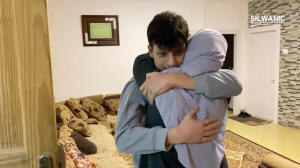Israel, Hamas abide by truce, discuss further extensions
 Send a link to a friend
Send a link to a friend
 [November 28, 2023]
By Nidal al-Mughrabi and Dan Williams [November 28, 2023]
By Nidal al-Mughrabi and Dan Williams
CAIRO/JERUSALEM (Reuters) -Israeli forces and Hamas fighters abided by a
truce for a fifth day on Tuesday, after a four-day ceasefire was
extended at the last minute by at least 48 hours to let more hostages go
free.
A single column of black smoke could be seen rising above the
obliterated wasteland of the northern Gaza war zone from across the
fence in Israel, but there was no sign of jets in the sky or rumble of
explosions.
Both sides reported some Israeli tank fire in the Sheikh Radwan district
of Gaza City in the morning, but there were no immediate reports of
casualties. A spokesperson for the Israeli Defence Forces said: "After
suspects approached IDF troops, an IDF tank fired a warning shot."
During the truce, Hamas fighters released 50 Israeli women and children
as young as toddlers from among the 240 hostages they captured in
southern Israel during a deadly rampage on Oct. 7. In return, Israel
released 150 security detainees from its jails, all women and teenagers.
Hamas also released 19 foreign hostages, mainly Thai farmworkers, under
separate deals parallel to the truce agreement.
Israel has said the truce could be prolonged as long as Hamas continues
to release at least 10 hostages per day. But with fewer women and
children left in captivity, keeping the guns quiet beyond Wednesday
could require negotiating to free at least some Israeli men for the
first time.

"We hope the occupation (Israel) abides (by the agreement) in the next
two days because we are seeking a new agreement, besides women and
children, whereby other categories that we have that we can swap," Hamas
official Khalil Al-Hayya told Al Jazeera late on Monday.
Israeli security cabinet minister Gideon Saar told Army Radio that the
two-day extension had been agreed under the terms of the original offer,
and Israel remained willing to extend the truce further if more hostages
were released.
"Immediately upon the completion of the hostage-recovery framework, the
warfighting will be renewed," he said.
Qatar, the main mediator of the truce in negotiations also involving
Egypt and the United States, was now trying to secure a further
extension based on Hamas releasing more hostages, its foreign ministry
spokesperson, Majed Al-Ansari, said.
FIRST RESPITE
The truce brought the first respite to the Gaza Strip in seven weeks,
during which Israel had bombed swathes of the territory, especially the
north, including Gaza City, into a desolate moonscape. More aid was able
to reach the territory, which had been under a total Israeli siege.
Israel has sworn to annihilate Hamas, the militant group that rules
Gaza, after its gunmen burst across the fence and went on a violent
spree, killing around 1,200 people and seizing 240 captives.
Since then, Gaza health authorities deemed reliable by the United
Nations say more than 15,000 people have been confirmed killed in
Israel's bombardment, around 40% of them children, with many more dead
feared to be lost under rubble.
More than two-thirds of Gaza's 2.3 million people have lost their homes,
trapped inside the enclave, with thousands of families sleeping rough in
makeshift shelters with only the belongings they could carry.

[to top of second column]
|

Dujana Attoun, a Palestinian prisoner released as part of a deal
between Israel and the Palestinian Islamist group Hamas, is welcomed
by his family, in Sur Baher, Jerusalem, November 27, 2023, in this
screengrab obtained from a social media video. Silwanic/via REUTERS

When the war resumes, Israel has made clear it intends to press on
with its assault from the northern half of Gaza into the south. U.S.
officials said they have told their ally to be more careful about
protecting civilians as its forces press on into areas where there
are fewer opportunities to escape.
"You cannot have the sort of scale of displacement that took place
in the north replicated in the south. It will be beyond disruptive,
it will be beyond the capacity of any humanitarian support network,"
one U.S. official said in a call with reporters. "It can't happen."
CLASHES OUTSIDE PRISON
Despite releasing 150 detainees under the truce, Israel has been
arresting Palestinians far faster than it lets them go: according to
the Palestinian Prisoners' Club, a semi-official organisation, 3,290
Palestinians have been detained since Oct 7.
As Israel released the final 33 detainees under the original
agreement on Monday night from its Ofer prison in the occupied West
Bank, its forces clashed with some of the dozens of Palestinians
waiting outside.
Some of the protesters waved the flags of Hamas and Islamic Jihad,
another Palestinian militant group. The Palestinian health ministry
said one Palestinian was killed in the area. Israel had no immediate
comment on the incident.
Israel added an additional 50 Palestinian women to its list of 300
detainees cleared for release under the truce, seen as a sign it was
prepared to negotiate for more hostages to go free under further
extensions.
Any release of male Israeli civilians would be expected to begin
with fathers and husbands captured along with the children and women
freed in recent days, like Ofer Calderon, whose daughters Sahar and
Erez were freed on Monday.
"It is difficult to go from a state of endless anxiety about their
fate to a state of relief and joy," said Ido Dan, a relative, about
the release of the two girls.

"This is an exciting and heart-filling moment but ... it is the
beginning of a difficult rehabilitation process for Sahar and Erez,
who are still young and have been through an unbearable experience."
Israel's siege has led to the collapse of Gaza's health care system,
especially in the northern half of the territory where no hospitals
remain functioning. The World Health Organization said more Gazans
could soon be dying of disease than from bombing.
WHO spokesperson Margaret Harris, citing a U.N. report on the living
conditions of displaced residents from northern Gaza, said there was
already a very high number of cases of infants suffering from
diarrhoea: "No medicines, no vaccination activities, no access to
safe water and hygiene and no food."
(Reporting by Reuters bureaux; Additional reporting by Rami Amichay
in Tel Aviv and Ali Sawafta in Ramallah; Writing by Peter Graff;
Editing by Nick Macfie)
[© 2023 Thomson Reuters. All rights
reserved.]This material
may not be published, broadcast, rewritten or redistributed.
Thompson Reuters is solely responsible for this content. |